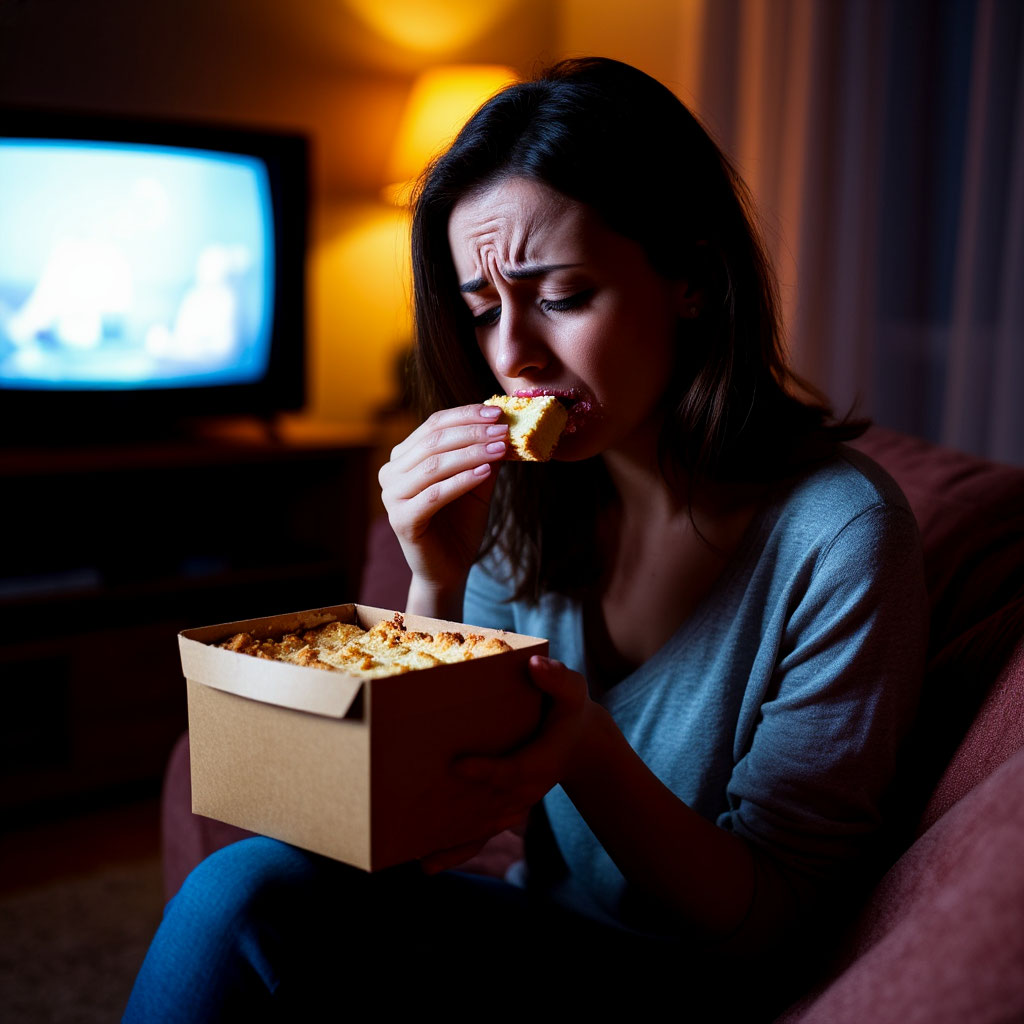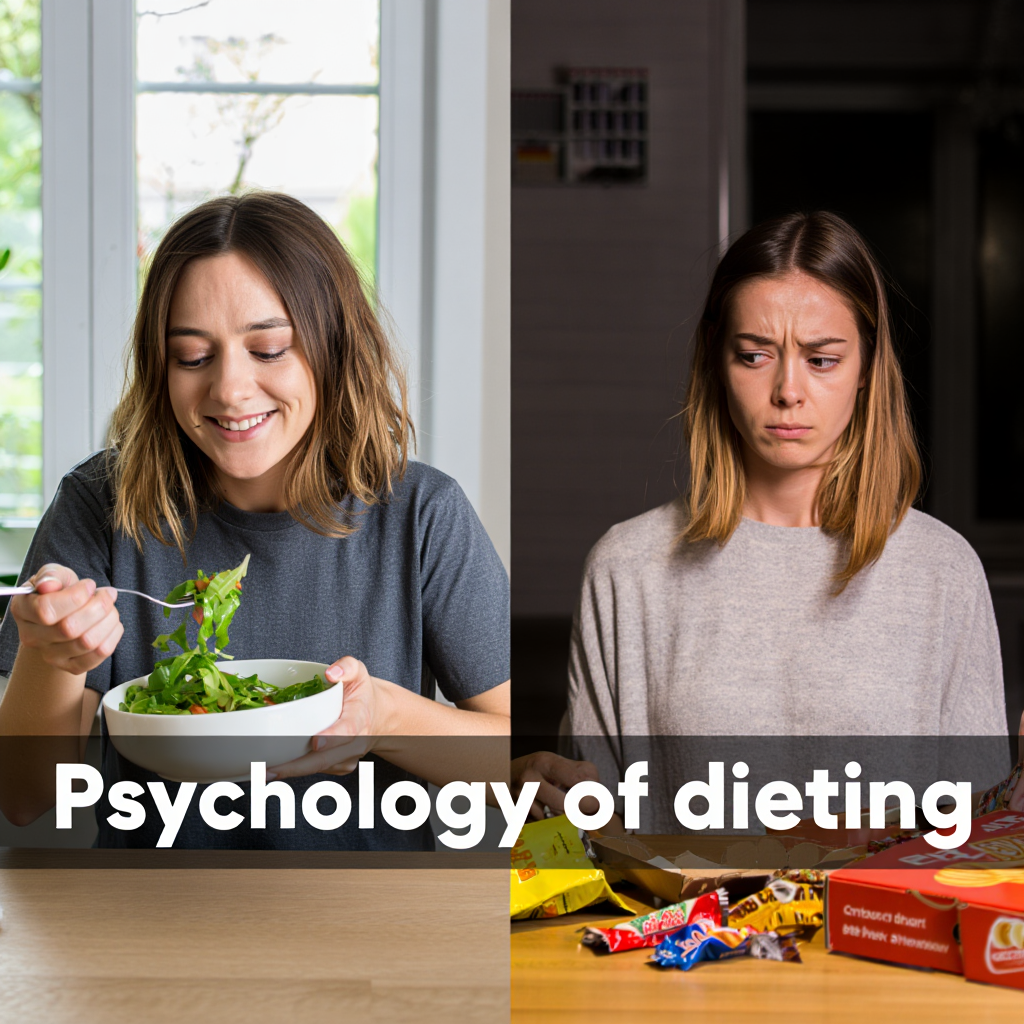
You know the feeling: you’re eating salads, sweating at the gym — but your weight won’t budge. Or worse: you lost a few pounds, then gave in to a late-night binge, followed by that sinking guilt of “I’m hopeless.”
Here lies the real catch: the psychology of dieting. Because losing weight isn’t just about calories and workouts. It’s about emotions, fears, habits, and childhood beliefs like “you have to clean your plate.”
You can start a “new life on Monday” a hundred times, but if you don’t figure out why your hand reaches for chocolate after an argument, all efforts will be in vain.
This article isn’t another list of “100 ways to lose weight in a week.” We’ll look deeper — at how our thoughts and feelings drive appetite, the traps we fall into, and how to break the cycle.
Stuck with weight loss? We prepared a Beauty Club mini-brochure with a 7–14 day self-audit, the most common blockers and fixes, simple protein/fibre targets, and a weekly plan you can actually keep. You’ll find a PDF download at the end of this article to save and print.

How Emotions Affect Eating: Why We Eat Without Hunger
The psychology of dieting doesn’t start with counting calories — it starts with understanding what makes people overeat. Often the issue isn’t weak willpower, but unconscious emotional triggers.
Food as Stress Relief
When anxiety spikes, the brain looks for instant pleasure. Chocolate, chips, or soda give a quick hit of dopamine — the feel-good hormone. It creates the illusion of relief, but only briefly. This sets up a vicious cycle: stress → overeating → guilt → more stress.
Boredom and the Habit of “Time-Snacking”
Sometimes we eat not from hunger but from boredom. Watching shows, working at the computer, or long commutes often come with automatic snacking. This isn’t a physical need — it’s a psychological habit that undermines motivation to lose weight.
How Negative Emotions Trigger Diet Slips
Disappointment, fatigue, or loneliness can all trigger overeating. We tell ourselves, “I had a hard day — I deserve cake.” The problem? “One piece” turns into a full-on binge, followed by delaying weight loss efforts “until Monday.”
Why Strict Rules Backfire
The stricter the rules, the stronger the urge to break them. Banning favorite foods leads to obsessive thoughts and guilt for “breaking the rules.” A psychological approach avoids the good/bad food dichotomy and encourages balance instead.
Breaking the Emotion-Food Link
Awareness is the first step. Keeping a food journal helps you track when automatic snacking kicks in. Instead of fighting urges, find soothing alternatives: walking, breathing exercises, or hobbies.
The psychology of dieting shows that without addressing emotional triggers, restrictions only give temporary results. Emotional work is the key to lasting change.

Mental Traps: How We Sabotage Our Own Weight Loss
The psychology of dieting isn’t just about willpower. It’s also about sneaky brain tricks that sabotage progress. Even the most motivated people fall into thinking traps that quietly ruin their plans.
Top 5 Traps That Undermine Weight Loss
- All-or-Nothing Thinking. “Strict diet starts Monday!” But one cookie or missed workout turns into “I blew it, might as well keep eating.” This black-and-white thinking kills motivation to lose weight.
- Self-Deception and Calorie Blind Spots. “I barely ate anything!” — forgetting the cake sample at work, syrupy cappuccino, and handful of “just a snack” nuts. Our brains underestimate intake.
- Addiction to Quick Results. Social media glamorizes “10 lbs gone in a week” stories, creating unrealistic expectations. When the scale stalls, disappointment strikes — and so does another binge.
- Food as Reward or Comfort. “I worked hard — I deserve pizza” or “I’m sad — I need chocolate.” This builds a dangerous emotional connection to food.
- The ‘Start Tomorrow’ Syndrome. Always delaying for the “perfect moment” that never comes. It’s avoidance disguised as planning.
How to Escape the Traps?
A psychological approach offers real-life strategies:
- Swap “I blew it” for “one slip doesn’t erase my progress.”
- Replace hidden snacking with an honest food journal.
- Focus on small, steady changes over instant transformations.
- Reward yourself in non-food ways.
- Take small actions now, instead of waiting for Monday.
The psychology of dieting teaches that simply recognizing these traps is already half the battle. The rest is practicing healthier thought habits.
Self-Help Methods: How to Stop Fighting Yourself and Start Changing
The psychology of dieting has long shown that harsh restrictions and self-punishment don’t work. What does? Learning to cooperate with yourself. But how does that look in real life?
Mindful Eating Over Food Policing
When food becomes a source of anxiety, with every bite tracked and guilt-ridden, your body resists. The psychological route restores the natural connection to your body.
It’s simple: before eating, ask two questions — “Am I really hungry?” and “What do I truly want?” It’s not about indulging every craving, but learning to tell physical hunger from emotional need.
A Food Journal: A Mirror to Habits
Tracking what you eat isn’t for punishment — it’s for insight. Often during journaling, people notice patterns: like diet slips always following a visit with a certain friend or at a certain time.
Log not only the food, but also:
- your emotional state;
- your location;
- who you were with.
These clues help you target the real triggers — not just the symptoms.
Other Ways to Process Emotions
If food is your go-to for handling stress, joy, or boredom, it becomes a crutch. The only way to break this bond is to find a satisfying replacement.
That could be movement — not punishing workouts “for weight loss,” but enjoyable motion. Or maybe:
- creativity;
- meditation;
- simple breathing exercises.
Experiment until you find what soothes you like your favorite “bad” snack once did.
Flexibility Over Perfection
The biggest myth is that healthy eating must be flawless. In truth, motivation to lose weight survives only where flexibility exists.
When you allow yourself the occasional detour without guilt, you dodge the “forbidden fruit” effect. What matters isn’t yesterday’s food — it’s the overall direction. This mindset makes changes sustainable, not temporary.
The psychology of dieting isn’t about struggle — it’s about understanding. When resistance fades, change becomes much easier.

Support and Motivation: How to Stay on Track
The psychology of dieting is a marathon, not a sprint. And like any long-distance run, success depends on more than willpower — it takes the right kind of support. Why do some people quit easily while others push through?
Loneliness Is the Enemy of Change
Going it alone makes every slip feel like personal failure. Without support, guilt grows, and motivation to lose weight drops. That’s why building a “support team” — people who get your goals and are willing to help — is crucial.
But choose carefully: not all company is helpful. Some “well-meaning” friends sabotage your efforts with “Oh come on, one bite won’t hurt!” A psychological approach means curating your environment — connect with those who share or respect your values.
Finding Inspiration When You’re Running on Empty
Early on, enthusiasm fuels everything: cooking healthy meals, working out, reading wellness articles. But eventually the spark fades, and a motivation crisis hits.
In those moments, try:
- Reading real (not extreme) success stories.
- Looking at “before and after” photos — yours or others’.
- Setting concrete goals like “fit into old jeans” or “climb three flights without wheezing.”
The Role of Professional Help
Sometimes personal effort and loved ones aren’t enough — and that’s okay. The psychology of dieting recognizes the need for outside perspective.
A dietitian can adjust your plan without extremes. A therapist can uncover deeper reasons behind overeating. A single session can save months of trial and error.
Turning Motivation Into Habit
Inspiration is fickle: here today, gone tomorrow. What matters more is creating a system that works even on lazy days.
Try:
- Celebrating small wins (chose salad over fast food today? Win!).
- Planning “cheat meals” to prevent unscheduled binges.
- Taking baby steps — not “new life Monday,” but “do one good thing today.”
The psychology of dieting says lasting change comes from a mix of self-discipline and self-kindness. When you stop beating yourself up and start noticing progress, it stops feeling like a battle and starts feeling like becoming your best self.

Habits and Beliefs: Reprogramming the Mind for Lasting Results
The psychology of dieting reveals a simple truth — the body follows the mind. Before your figure changes, your beliefs about food and self must change. Most people don’t realize their thoughts are the biggest obstacles.
Invisible Beliefs That Block Weight Loss
“Bad genetics,” “after 40 metabolism tanks,” “I just can’t control myself” — these become self-fulfilling prophecies. A psychological approach means spotting and replacing such beliefs.
Ironically, people will stick to a diet for months but won’t spend a few days analyzing their thinking — even though mental blocks are often behind repeated failures.
Rituals Instead of Restrictions
Harsh rules create rebellion. Better to form new habits that slowly replace old ones. For example:
- drink water 20 minutes before eating;
- use smaller plates;
- eat without distractions.
These micro-habits don’t require huge effort but completely shift your relationship with food over time.
Sleep: An Unexpected Ally
Science proves: lack of sleep raises ghrelin (hunger hormone) and lowers leptin (fullness hormone). No wonder it’s hard to control appetite after a bad night. Motivation to lose weight should include rest, not just meal plans.
Designing a Supportive Environment
Modern life constantly tempts us: food ads, office treats, family feasts. Changing your space is key:
- hide tempting snacks;
- prep healthy options in advance;
- change your routes to avoid bakeries.
Patience as a Strategy
In an age of instant results, it’s hard to accept a truth: real change takes time. The psychology of dieting reminds us that the body resists abrupt change, seeing it as a threat. Slow, steady shifts lead to lasting results.
When you stop chasing fast fixes and start enjoying the process, a shift happens — healthy habits become your lifestyle. Control becomes unnecessary. The body naturally finds its best state.

Coming Home to Yourself — Without a Fight
The psychology of dieting reveals a surprising truth: excess weight is rarely just physical. It’s often a mirror of inner conflict, unspoken feelings, and outdated beliefs.
The most common mistake? Going to war with your body. Harsh diets, brutal workouts, constant tracking — all this fuels stress, which leads to more binges. But what if you tried something different?
3 Mindset Shifts for Real Results
- Food is fuel, not the enemy. When you stop labeling food as “good” or “bad,” the guilt after eating fades. What matters is your overall pattern — not the occasional indulgence.
- Motivation lives in the process, not the goal. We burn out because we only focus on the finish line. The real win is enjoying self-care — from tasty, healthy meals to mindful movement.
- Feel your emotions — don’t feed them. Breaking the food-emotion bond means learning to meet your real needs. That craving for “something sweet” may be exhaustion, boredom, or a cry for comfort.
Don’t try to change everything at once. Start small:
- Keep a food + feelings journal for 3 days — patterns will appear.
- Add one healthy food instead of banning “bad” ones.
- Find a joyful activity, not a punishing one.
The psychology of dieting isn’t about rules — it’s a guide to understanding yourself. When you stop the fight and start listening to your real needs, your body will follow — gently, naturally, and with self-respect.
Tweak small levers first: protein at every meal, more steps, steadier sleep — then review progress weekly and adjust.
Download the brochure (PDF): Beauty Club — Why You Can’t Lose Weight: Inside Look



